Calendar
November 2024 M T W T F S S « Jun 1 2 3 4 5 6 7 8 9 10 11 12 13 14 15 16 17 18 19 20 21 22 23 24 25 26 27 28 29 30 -
Recent Posts
Recent Comments
Archives
Categories
Author Archives: owner
Periodontal Disease
Gum Disease can range from mild to severe. This is a picture of moderate to severe periodontal disease.
Advanced gum disease can affect any adult and even some children, what is most note worthy in this picture is the extra tooth. Look at the first picture and notice the extra incisor, there normally are 4 and 5 are clearly labeled!
Posted in Periodontal Disease
Leave a comment
Severe Gum Disease
This is the usual end result of untreated severe gum/periodontal disease, dentures or no teeth at all. I have been treating people with severe gum disease in Palm Harbor, Tampa Florida for more than 24 years. In all these years of practicing dentistry in Palm Harbor some patients with periodontal disease have been able to stabilize and maintain their teeth and others have either gradually lost them or chosen to have them removed.
My observation is that MOST people can get used to upper dentures, while MOST people do not ever get used to lower dentures (for them dental implants can be a viable and cost effective solution.)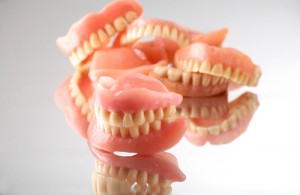
Posted in Gum Disease
Leave a comment
Gum Disease Prevention
Can gum disease be prevented? Yes in most circumstances, no in rare instances. Periodontal disease prevention is centered around plaque control (brushing, flossing, professional maintenance), healthy lifestyle (smoking, eating, clenching teeth), good health and good genetics.
Plaque, tarter, calculus was thought to be the only cause for gum disease when I was in the Columbia University School of Dental and Oral Surgery in the early 1980’s. It is the major risk factor but certainly not the only factor. Personal habits and genetic have a major impact also.
Without a doubt the earlier in life a person realizes and takes control of their own life/dental health, the lower the chance of gum disease and the greater chance for one to keep their teeth.
I have been a practicing dentist, treating gum disease, in Palm Harbor FL since 1988. Nowadays dentists/patients have many treatment options. Speak with your dentist or call my office if you are in need of help.

Posted in Gum Disease
Leave a comment
Gum Disease and Smoking
Cigarette/cigar smoking is a risk factor for periodontal disease. This has been firmly established.
While I was in the Columbia University School of Dental and Oral Surgery in the early 1980’s, it was believed that smoking and periodontal disease were somehow connected. Research since that time has definitively linked smoking and gum disease. Aside from the obvious ill effects from smoking, the pharmacology of the nicotine and the additives must be considered. Nicotine is a vasoconstrictor. The small blood vessels in the mouth/gums/periodontium are closed down, less blood flows, less oxygen, nutrients, etc
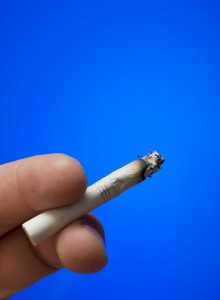
Posted in Gum Disease
Leave a comment
Periodontal Disease
Advanced Gum Disease can affect people of all ages. This is a picture of the mouth of a young woman with advanced periodontal disease. Due to financial considerations, the treatment chosen was extraction of all but two lower teeth. This young woman ended up with a full upper denture, a lower partial denture, a much healthier mouth, a beautiful smile, greater self esteem all on a budget!
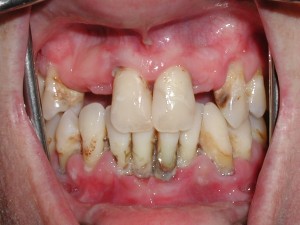
Posted in Periodontal Disease
Leave a comment
Periodontal Disease and Tooth Loss
Funny picture? Truth of the matter is this man has NO teeth. The face collapses upon tooth loss. The main reason adults and seniors loose teeth is severe periodontal disease. Tooth loss is not inevitable. In fact, due to the many types of gum disease treatment available in the 21st century, people are keeping their teeth longer.
This picture may be funny, but I am sure he cannot enjoy fresh vegetables, apples or steak, hamburger maybe.
Treatments for periodontal disease range, dental cleanings, deep cleaning, Arestin placement, laser gum treatment, gum surgery, periodontal bone grafting, treatment options go on and on. The best treatment is prevention.
Posted in Gum Disease
Leave a comment
What happens to someone with gum disease?
The result of gum disease varies depending on the severity as well as the patients overall health. Early gum disease or gingivitis with no bone loss can usually be treated with a routine dental cleaning. Severe periodontal disease usually results in tooth loss with possible overall systemic health implications. In this picture taken in my Palm Harbor FL dental office, two upper molars and one upper bicuspid are visible shortly after they were extracted. Periodontal or gum disease is treated on a regular basis by most dentists. A periodontist is a dentist who specializes in the treatment of gum disease. Many periodontists also place dental implants, but they do not make the dental crowns or dentures. There is no dental specialty of oral implantology.
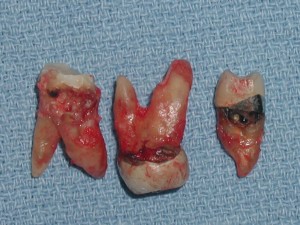
Posted in Gum Disease
Leave a comment
Periodontal Disease Treatments
America Dental Association has estimated that about 50% of adults over the age of 18 have early signs of periodontal disease.
Bad breath is a common sign of periodontal disease that happens when your gums become so infected that the gums begin to ooze and suffer consumes the infection.
Your gums are what hold your teeth in place and chronic periodontal disease is a major cause of tooth loss in adults. Your teeth can be free of decay but you can still suffer from periodontal disease and your teeth in result can be lost. There are some risk factors of developing periodontal disease smoking, oral hygiene, age, diabetes, bacteria and also your genetic disposition.
Periodontal disease is when the gums start to become inflamed and infected with mucus, food particles bacteria and accumulated plaque. Gums will start to swell at this point so much that more plaque and food gets trapped in the pocket. You will notice at this time your gums are no longer pink and taught they now begin to look puffy, swollen, red and frequently bleeding.
There are alternatives to treating periodontal disease by non surgical treatment such as a prescription mouth rinse in conjunction with brushing and flossing daily. For patients with more sever periodontal disease you may want to have a much deeper cleaning were the hygienist does one side of the mouth at a time. The hygienist then will get down to the base of the root and remove the calculus deposits that may be present. The hygienist will then flush out any bacteria or disease present in the gums. This is a pain free procedure that doesn’t always call for a needle. The hygienist also has a numbing gel called ORIKIS that numbs the gums long enough to clean the teeth. Also if you have deep pockets of more then 5mms deep the hygienist can also place a site specific antibiotic that is called ARESIN. The hygienist places the antibiotic in the deepest pockets that hardens over time with your blood and saliva. The ARESIN stays active for 21 days and helps clear up bacteria and infection caused by periodontal disease. Once the infection and bacteria is cleared up or under control the gums will start to adhere back to the roots of the teeth. After the periodontal disease is under control you must have more frequent cleaning recalls every 3 months to check the healing and monitor the periodontal disease to make sure the gums stay clean of debris that may get trapped in the gums. This insures the healing of periodontal disease. After the periodontal disease continues to heal you may eventually start having 4 month cleaning recalls. Again your mouth must be closely monitored to insure healing of periodontal disease. You will remain on 3 or 4 month recalls.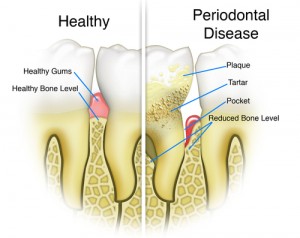
Posted in Gum Disease, Periodontal Disease
Leave a comment
Do You Have Periodontal Disease?
I came across this short little test that assesses your gum disease risk. Please click on the link below and see how you rate.
Posted in Gum Disease, Periodontal Disease
Leave a comment
Gum Disease and Pregnancy
For a long time we’ve known that risk factors such as smoking, alcohol use, and drug use contribute to mothers having babies that are born prematurely at a low birth weight.
Some studies have suggested the possibility of an additional risk factor – periodontal disease. Pregnant women who have periodontal disease may be more likely to have a baby that is born too early and too small. However, more research is needed to confirm how periodontal disease may affect pregnancy outcomes.
All infections are cause for concern among pregnant women because they pose a risk to the health of the baby. The Academy recommends that women considering pregnancy have a periodontal evaluation.
Posted in Gum Disease, Periodontal Disease
Leave a comment















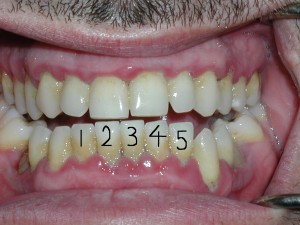
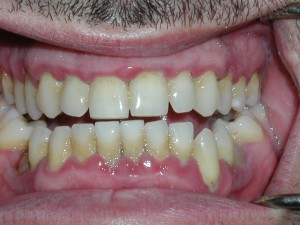

![images[5]](http://periodontaldisease.us/wp-content/uploads/2012/01/images5.jpg)